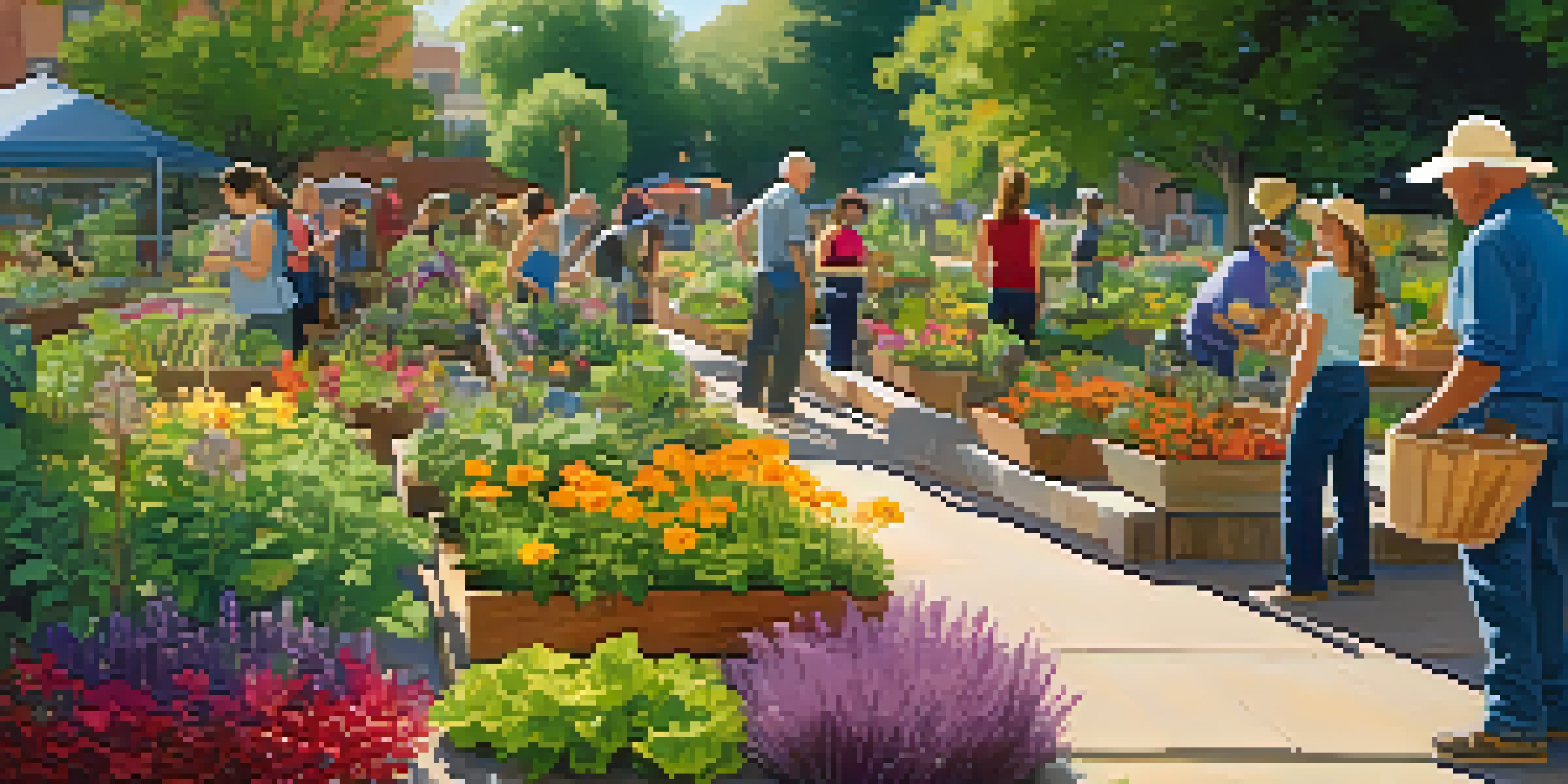The Role of Community Gardens in Promoting Health

Understanding Community Gardens and Their Purpose
Community gardens are shared spaces where individuals come together to grow fruits, vegetables, and flowers. These gardens often transform vacant lots into vibrant green spaces that serve the local population. They not only provide fresh produce but also foster a sense of community and belonging.
The greatest gift of the garden is the restoration of the five senses.
In these gardens, people of all ages and backgrounds can participate, helping to break down social barriers. The collaborative spirit encourages friendships and connections, which are vital for mental and emotional well-being. Essentially, community gardens act as a microcosm of society, promoting inclusiveness and teamwork.
Beyond just growing food, community gardens often educate participants about sustainable practices and healthy eating. This knowledge is crucial for making informed dietary choices, which can lead to healthier lifestyles overall. Thus, the purpose of community gardens extends far beyond simple agriculture.
The Nutritional Benefits of Community Gardens
One of the most significant advantages of community gardens is the access to fresh, nutritious produce. Participants can grow their own vegetables and fruits, which often leads to healthier eating habits. Having fresh food readily available encourages individuals to incorporate more fruits and vegetables into their diets.

Moreover, community gardens often promote organic gardening practices, which can lead to healthier food options free from pesticides. This is particularly important in urban areas where access to fresh produce is often limited. When people know where their food comes from, they are more likely to appreciate its value and make healthier choices.
Community Gardens Foster Connection
These shared spaces promote social interactions and friendships, creating a sense of belonging among diverse individuals.
In addition to individual health, these gardens can contribute to community food security. By growing food locally, communities can reduce dependence on commercial grocery stores, ensuring that everyone has access to nutritious options. This aspect highlights how community gardens can play a critical role in promoting overall public health.
Mental Health Benefits of Gardening Together
Gardening is not just about planting seeds; it’s also about cultivating mental health. Engaging in gardening activities has been shown to reduce stress and anxiety levels. The act of nurturing plants can be meditative, allowing individuals to escape from daily pressures and find peace in nature.
Gardening is a way of showing that you believe in tomorrow.
Community gardens create a space where people can share their gardening experiences, challenges, and successes. This social interaction fosters a supportive environment that can uplift spirits and combat feelings of loneliness. When individuals feel connected to others, their overall mental health improves.
Additionally, the physical activity involved in gardening can release endorphins, those feel-good hormones that boost mood. So, while one might think of gardening simply as a hobby, it can have profound effects on mental well-being, making community gardens a vital resource for emotional health.
Fostering Community Connections Through Gardening
Community gardens are unique in their ability to bring people together from various walks of life. They create a sense of belonging and promote social interactions that may not occur otherwise. Whether it's through planting events or harvest festivals, these gardens offer numerous opportunities for community bonding.
As people work side by side, they share stories and experiences, building trust and friendships. This sense of connection can lead to stronger community ties and a more supportive environment. When individuals collaborate on a common goal, they develop a sense of ownership and pride in their community.
Health Benefits of Fresh Produce
Access to nutritious, locally grown food encourages healthier eating habits and contributes to community food security.
Moreover, these gardens often serve as hubs for local events and educational workshops, further enhancing community engagement. By participating in these activities, residents can learn new skills while also forging lasting relationships. This interconnectedness is a crucial component of healthy communities.
Promoting Environmental Awareness and Sustainability
Community gardens play an essential role in promoting environmental consciousness. By engaging in gardening, individuals learn about sustainable practices such as composting and organic farming. This hands-on experience fosters a deeper understanding of the relationship between food production and the environment.
Furthermore, these gardens contribute to urban biodiversity by providing habitats for various species. They can help mitigate urban heat, improve air quality, and manage stormwater runoff. When residents actively participate in caring for their environment, they become more invested in sustainability efforts.
As community members grow their own food, they gain insight into the importance of local ecosystems. This knowledge can inspire them to advocate for environmental issues and make more responsible choices in their daily lives. In this way, community gardens serve as powerful tools for environmental education.
Educational Opportunities in Community Gardens
Community gardens are not just about growing plants; they are also vital educational spaces. Many gardens offer workshops and classes on topics ranging from gardening techniques to nutrition education. These programs empower individuals with knowledge that can enhance their quality of life.
Children, in particular, benefit from hands-on learning experiences in community gardens. They can observe the cycles of nature, understand where food comes from, and develop a sense of responsibility for nurturing plants. This early exposure can instill lifelong values around health and sustainability.
Gardens Promote Environmental Awareness
Through hands-on gardening experiences, individuals learn about sustainability and the importance of caring for local ecosystems.
Additionally, community gardens can collaborate with local schools, providing students with practical knowledge outside the traditional classroom setting. This integration of education and gardening fosters a culture of learning that extends beyond the garden's borders, creating informed and engaged citizens.
Conclusion: The Lasting Impact of Community Gardens
In conclusion, community gardens are much more than just plots of land for growing food. They serve as vital resources for enhancing health, building community connections, and promoting environmental awareness. The benefits of these gardens ripple through neighborhoods, touching the lives of many individuals.
As we face challenges related to health disparities and environmental issues, community gardens offer a sustainable solution. They encourage individuals to take an active role in their health and their community, promoting a sense of agency and empowerment. The impact of these gardens can lead to healthier, happier, and more connected communities.

Ultimately, the role of community gardens in promoting health is profound and far-reaching. By investing in these spaces, we are investing in the well-being of our communities, paving the way for a healthier future for all.